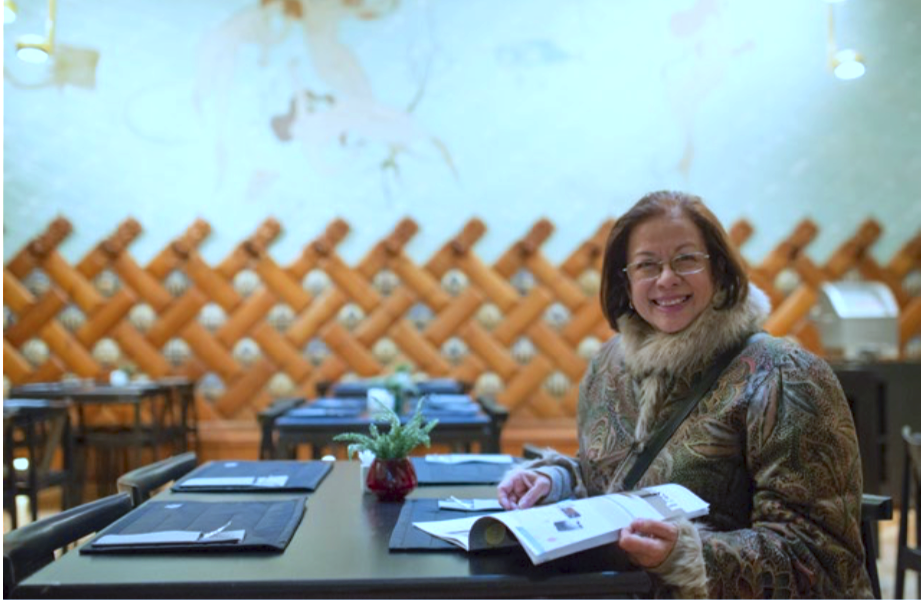Jose Rizal‘s great grand niece Noelle Sy-Quia, shares her memories of the Rizal family, how she feels about living in Spain, and the lessons she learned from the Philippine’s greatest hero.
We are in a small coffee shop in front of the San Agustin Church, also known as the Filipino Personal Parish. The place is full to the rafters –a typical scene on a Sunday morning right after the ten o’clock mass in Filipino. A couple of blocks away is the Plaça del Buensuccés where a plaque was installed by the city government of Barcelona commemorating the place where Rizal founded the newspaper La Solidaridad with his fellow Filipino writers.
The noise in the cafe seems to fade into the background as Noelle Sy-Quia, the great grandniece of Philippine national hero Dr. José Protacio Rizal, starts to talk about her great grandmother Maria Mercado Rizal.
Little is known about Maria, the 6th child of Teodora and Potenciano Mercado, as only a handful of books mention her name. Maria, born in 1859 and died in 1945, married Daniel Faustino Cruz of Biñan, Laguna. Their children were Encarnacion and Mauricio. Encarnación married Rosendo Banaad and Mauricio married Concepcion Arguelles. The two other children were Prudencio, Petrona and Paz, who all died young.
“I did not get to meet Maria Rizal or I was too small to remember. My mother would sometimes get inspired to tell stories about Jose Rizal but somehow she would always start with [the poem] Mi Ultimo Adios. She would recite the first stanza but she would start crying and say, ‘I won’t manage again. Go play. We will do it another time.’”
Noelle (Didith) Sy-Quia, Jose Rizal great-grand niece in Spain
Didith, as she is known to friends and family, didn’t ask her mother why.
After Rizal’s execution, Maria had gone back to her parents’ house because she left her husband, a gambler and a womanizer.
Sy-Quia remembers a story when her great grandmother, together with the rest of the family, had to flee the house in Calamba one night. Somebody had tipped them that they were going to be arrested the following day.
“The ladies, so they wouldn’t have to carry so many things, took the stones out of their jewelries. They wrapped them and hid them in small pouches.”
Maria was two years older than Rizal. It was not clear whether Maria was Rizal’s favorite sister. However, in one of Rizal’s letter to Maria sent from Heidelberg, Germany, he wrote,
“Oh well, you know you will enjoy it here because women are intellectually advanced.”
“As a rule, we don’t overburden any of the family members with the hangs ups, so to speak, of the previous generation. I moved to Spain because it was more convenient. I had relatives here that time.”
Noelle Sy-Quia, Jose Rizal’s great grand niece in Spain

Living up to expectation
Children of high-profile personalities, leaders and celebrities live under constant public scrutiny, expected to live up to the legacy of their famous family member. Having a national hero as a great-grand uncle surely must put anyone under great pressure?
But Sy-Quia plays down the notion.
“Rizal wrote a code of ethics and somehow this has been ingrained in us. It comes with our DNA. It’s not really a pressure. You have a set of values that is already set for you and you don’t have to look for it. It is there, already established. We don’t have to be waving it this way or the other way.”
Noelle Sy-Quia, Jose Rizal’s great grand niece in Spain
According to her, they were not obliged to read Rizal’s works while growing up. It was something they did voluntarily. Sy- Quia admits she has yet to read all of her great granduncle’s works.
Sy-Quia says that one of the eldest in the family, 100-year-old Francisco Lopez, the son of Paciano, still recites the whole 14 stanzas of the poem, Mi Ultimo Adios, each time he wakes up in the morning. His nurse has learned to recite it as well by hearing it all the time.
According to her, the remaining family members still keep in touch with each other.
“As long as my mother lives, we are still sort of close because they still know each other. But eventually everybody will go on with their professional lives.” In fact, the whole family celebrated together Rizal’s 150th birthday.
Sy-Quia says that there are two family members from Paciano’s side who live in Johannesburg. “My son goes there which keeps both our families stay connected.”
Them, the Friars
When Rizal died, the family moved to Manila. They all stopped going to church. When the Spaniards left, they went back. In fact, she had an uncle who was a Jesuit and an aunt who is a Carmelite nun.
The family does not condemn the Spanish government, not even its people for what happened to Rizal.
“It was the Dominican friars [who were responsible for his death]. And we are still demanding an apology from them,” says Sy-Quia.
Some history books mentioned that Camilo de Polavieja, who oversaw the court martial and death of Jose Rizal on Dec. 30, 1896, was condemned by his countrymen after his return to Spain. The then governor-general of the Philippines, Ramon Blanco later presented his sash and sword to the Rizal family as an apology.
Filipino connection
Sy-Quia came to Spain in 1968. Prior to that, she had been living in the UK since she was 12 years old. One is left to wonder why she went to Spain and live there.
“As a rule, we don’t overburden any of the family members with the hangs ups, so to speak, of the previous generation. I moved to Spain because it was more convenient. I had relatives here that time,” explains Sy-Quia.

Retired and proud
Now retired and a doting grandmother, Sy-Quia plans to spend more time in the Philippines –if only she wouldn’t be so far away from her grandchildren who are all based in Europe. She has also taken on a new hobby -string jewelry. She says it’s simply continuing a family tradition.
“When Maria, then pregnant with her 5th child, left her husband and went back to her parents’ house, she had to start from scratch. With the money she had left in her pocket, she bought galapong, sugar and grated coconut. She made a batch of palitaw and sent her maid to the market to sell it. She also created jewelries as a hobby, which I am continuing now.”
Lessons from Jose Rizal
Throughout his works, Rizal talked about the importance of loving and respecting our parents, language, culture and most of all, our motherland. Sy-Quia says his teachings still apply even in today’s digital age when technologies are building gaps between parents and children.
“Read his essay, ‘The Philippines a Century Hence (Filipinas Dentro de Cien Años)’. It’s factual. One can apply it to their everyday life. Our country would be a much better place. We wouldn’t have such rough politicians.”
This article was first published in 2014, in Issue 6th Issue of The Filipino Expat Magazine.
What's Your Reaction?
Nats Sisma Villaluna has been serving the Filipino community in Spain for more than 15 years. His volunteer works include teaching Spanish to Filipinos, and as artistic director of the Coro Kudyapi, a group of musically inclined young Filipinos in Barcelona. His passion to serve the Filipino community now extends to other countries in his role as Publisher and Editor-in-Chief of the new The Filipino Expat Magazine.




